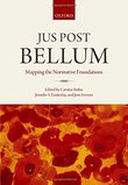Explore

Jus Post Bellum
0 Ungluers have
Faved this Work
Login to Fave
The successful transition from armed conflict to peace is one of the greatest challenges of contemporary warfare. The laws and principles governing transitions from conflict to peace (jus post bellum) have only recently gained attention in legal scholarship. This volume investigates questions concerning the core of jus post bellum: the law (“jus”), the temporal aspect (“post”), and different types of armed conflict (“bellum”). It is the first volume to clarify the different legal meanings and components of the concept, including its implications in contemporary politics and practice. It explores the nature of jus post bellum as a concept, including its foundations, criticisms, and relationship to related concepts (e.g. Transitional Justice, Responsibility to Protect). It rethinks the nexus of the concept to jus ad bellum and jus in bello and its relevance in internal armed conflicts and peacebuilding. It examines problems in relation to the ending of conflict, including indicators for the end of conflict, exit strategies, and institutional responses. It also identifies contours of a “jus,” drawing on disparate bodies and sources of international law such as peace agreements, treaty law, self-determination, norms governing peace operations, and the status of foreign armed forces, environmental law, human rights, and amnesty law. Taking into account perspectives from multiple disciplines, the book will be relevant to scholars, practitioners, and students across many fields, such as peace and conflict studies, international relations, philosophy, political science, and international law.
This book is included in DOAB.
Why read this book? Have your say.
You must be logged in to comment.
